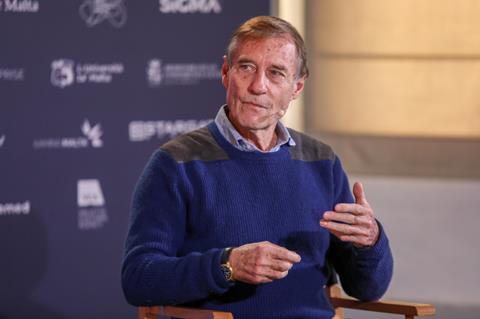
Veteran UK director Roland Joffé has given further details of the new international film school he is planning to establish in Malta.
Joffé is currently in “deep discussions” with the Maltese government and hopes to be able to formally announce the film school, which will be called The Malta Film Academy, “within a few months”.
“I want to start a film school that will give a powerful training in cinema but will also give people the chance to study international relations,” said Joffé, speaking during the inaugural Malta Film Week.
“I would like to breed a new generation of filmmakers who understand that for filmmakers now, you’re living in a world environment and you have to live with different cultures without annihilating those cultures and learn how to work with them.”
The film school is one of a raft of initiatives currently being hatched in Malta as the country seeks to bolster its status as a filmmaking hub. Construction is about to begin on a new €35m government-backed complex situated close to the Malta Film Water Tanks. The 4000-square-meter complex, which will be part of Malta Film Studios, will house a new soundstage, production offices and workshops.
Malta Film Commissioner Johann Grech also this week promised to further strengthen the 40% tax rebate currently on offer for international productions. It is understood that the next Mission Impossible film is currently scouting locations on Malta. In spite of the pandemic, several high-profile international productions have shot on the island over the last two years, among them Amblin Partners and Universal Pictures’ The Last Voyage Of The Demeter, Universal’s Jurassic World: Dominion and Sky/Bavaria Fiction’s drama series Das Boot, which has shot three seasons on the island.
Joffé’s proposed school already has support from the University of Malta. It will be open to UK and international students, as well as local ones, and will offer accredited degrees. “I will contribute where I can but we will have a fully qualified academic and professional staff,” said the filmmaker, a two-time best director Oscar nominee for The Killing Fields and The Mission.
Joffe and his collaborators also want to establish a summer course where students come “from all over the world and create three silent movies”.
“If the government play their cards in the right way, which it looks as if they want to, I think Malta could become a major European film hub,” Joffé predicted. “If they design the [new] studios with an eye to the new technology, they could turn Malta into a Mediterranean centre for the arts not just for cinema but for all the things associated with cinema. There is an immense amount of talent in terms of set and construction.”
Masterclass and next project
On the filmmaking side, Joffé is currently casting his next planned feature, The Maestro, set to star Julian Sands and being sold internationally by The Exchange. Finance permitting, the aim is to shoot later this year in Malta, with additional filming in either Poland or Germany.
Joffé has co-written the script with Gilles Thomas, which tells the story of an Italian conductor who joins forces with Israel’s Mossad to hunt down a missing Nazi after he discovers a renowned German conductor has been passing off.
“The project was brought to me in a first-draft screenplay, which I had to do a significant amount of reworking on, but for me, what was interesting is that it’s a story about resistance, it isn’t a story about victims,” said Joffé, speaking to Screen after giving a masterclass on directing at Fort Angelo in Malta. “I loved what it had to say about music and the fact that music itself is an act off resistance.”
During the masterclass, Joffé reflected on the intense pressure he came under from Warner Bros co-chairmen Robert Daly and Terry Semel to change the ending of The Mission, which won the Palme d’Or in 1986 and went on to receive seven Oscar nominations (winning for best cinematography) and 11 Bafta nominations (winning for score, editing and supporting actor).
In the film about 18th-century Spanish Jesuits trying to protect an indigenous South American tribe, star Robert De Niro’s character eventually died.
“Bob Daly said, ‘I love the film. It’s really great. I think it is going to win an Oscar but you’ve got one big problem: don’t kill the hero,’” Joffé recalled. “‘He’s got to win through – it’s a question of returns. Kill the hero, the movie might gross $25m. Save De Niro and it’ll be $100m.’”
The director, fully supported by producer David Puttnam, refused. “But as I walked out of there, I remember thinking to myself that I am not going to make it in Hollywood… [But] in my terms, I felt free.”






![The Brightest SunScreen[Courtesy HKIFF]](https://d1nslcd7m2225b.cloudfront.net/Pictures/274x183/3/5/0/1448350_thebrightestsunscreencourtesyhkiff_312678.jpg)


















No comments yet